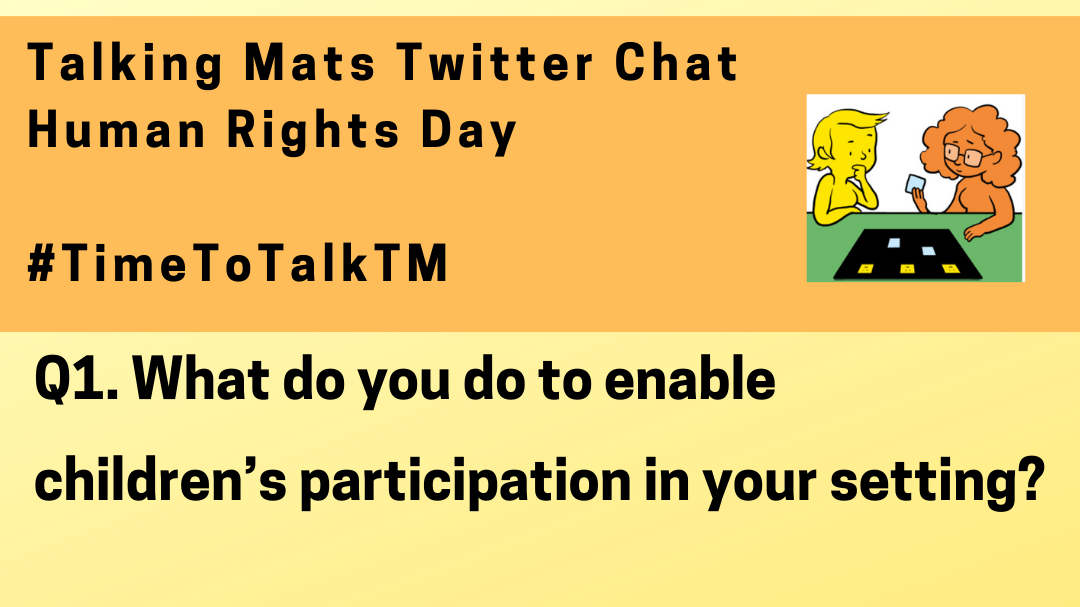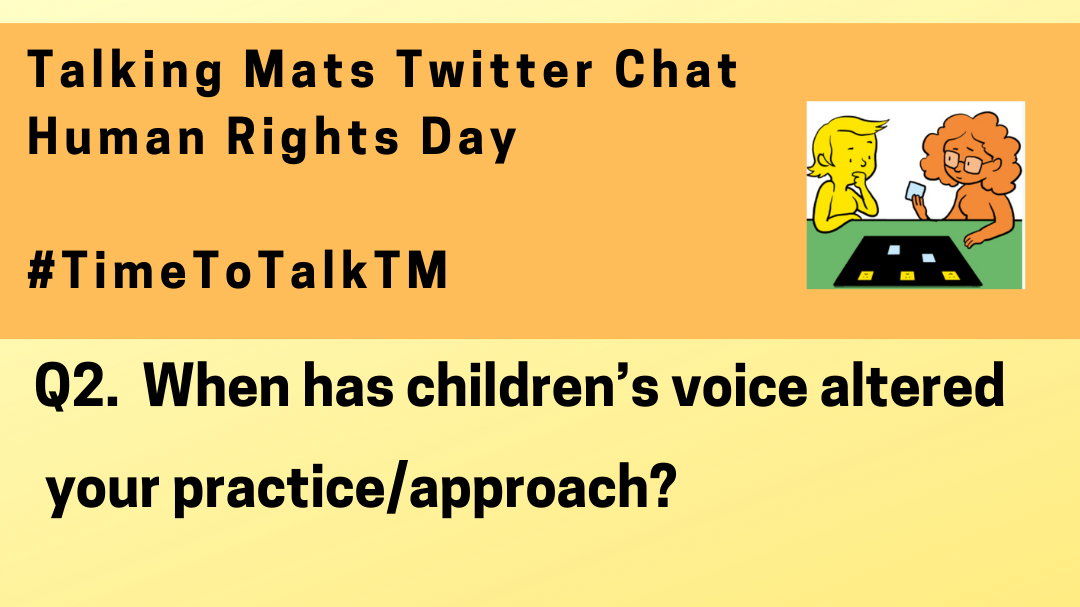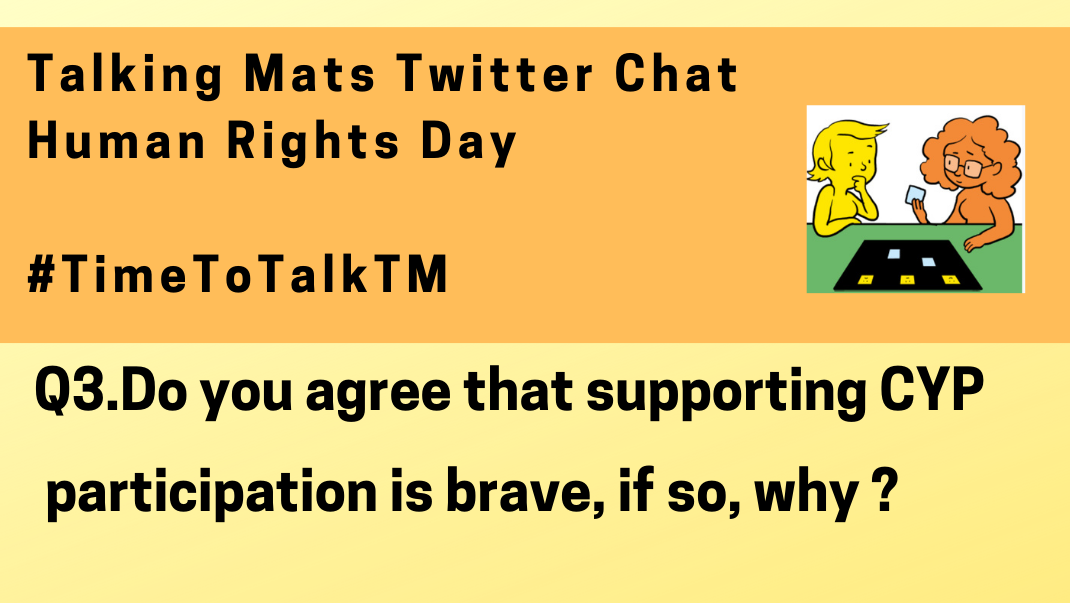Our thanks for this blog go to Olivia Ince, Talking Mats Licenced Trainer and Speech & Language Therapist. This blog post reflects on the use of a Talking Mat with a Thinker called M who speaks English as an additional language. The Listener in this Talking Mat is Jono Thorne who is a colleague of Olivia. Jono did this Talking Mat for his video as part of a Foundation Training course run by Olivia.
M is a young adult who came to the UK as an unaccompanied asylum-seeking child. M is from a country in Central Africa and speaks a language which is not widely spoken outside of the region. Accessing interpreting and translation services in the UK for their native language is very difficult and M has therefore had difficulties learning English. This means the people around M often have difficulties finding out M’s views, which is why Jono thought a Talking Mat could be an invaluable communication tool for M.
M already uses some visual support, for example hand gestures and using objects such as food items when having a conversation in the kitchen. The people around M are unsure what M’s level of comprehension is in English and therefore they make adaptions such as simplifying their language. M’s expressive language in English is typically the use of one- or two-word utterances and yes/no responses.
To see if M would be able to engage with the Talking Mat process, Jono chose a simple topic to start with and one which he knew would interest M: food. The Top Scale used was like/unsure/ don’t like. Jono noted that M quickly understood the concept of the Talking Mat and the visual element seemed to support M’s understanding. The Talking Mat process including the side-by-side listening also facilitated rapport building.

Jono noticed that M was decisive and seemed certain about their placement of the option cards. The Talking Mat helped M to share their views on a larger number of items than would likely have been possible via a verbal conversation. M also joined in with the recap of their Talking Mat as part of the review and reflect by reading out the Option cards with Jono, which meant M was even more involved with the process.
There were a couple of difficulties for M during the Talking Mat process: the blanks and the option to change where the Option cards were placed. Jono tried to explain these steps using simple language but M did not appear to understand these concepts due to their level of comprehension of English. As M had seemed sure of their initial placement of the Option cards and they joined in with the recap, Jono felt that the Talking Mat was an accurate reflection of M’s views that day. Continuing to model these steps to M will likely help them to develop their understanding of these parts of the Talking Mats process over time.
Jono reflected on how useful it was to now know which foods M likes and doesn’t like. He also reflected on the potential future use of Talking Mats with M on more complex topics and to facilitate participation in decision-making now that it’s clear M understands how a Talking Mat works.
If you are interested in completing Talking Mat Foundation Training, you can read more about it here.
Talking Mats is available both as a physical resource and as a digital web-app. In this blog, our Digital Lead, Mark, gives an update on some exciting recent developments on our Digital Talking Mats platform.
It’s been over 2 years since we launched our new Digital Talking Mats platform, and we’re so pleased that more and more of the Talking Mats community continue to discover how it can be used to improve conversations in a wide range of contexts and situations.
We’re always looking for ways to improve the user experience of Digital Talking Mats, and over the last couple of years we have so appreciated the feedback given by Talking Mats customers who have been using the platform.
This feedback has led to plenty of tweaks and updates behind the scenes, but in this blog I want to highlight some updates we have recently implemented, which we hope will improve the experience for those using our digital platform, and also let you know about what upcoming features are in the pipeline.
Grouping and Deleting Thinkers
Users can now create groups/categories for their Thinkers, and organise them in a way that is most helpful for their context. Whether it is school classes, hospital wards, or care homes, for example, users can choose what to name the groups, and how many Thinkers are in each group.

As well as creating Thinker groups, users now have the option to delete any Thinker from their list. This may be a former patient, a Thinker from a previous job, or simply a Thinker that was used to test out the digital platform.
Sharing Personalised Mats
For users who are Talking Mats trained and are part of a Digital Talking Mats Organisational Subscription, we’re excited to say that personalised Mats that have been created can be shared with other members of your organisation. This means that if you work in a specialist department and require a bespoke mat for your context, one member of your department can create a personalised Mat, and share with every member on the subscription.

Upcoming Feature: Private Resources
At Talking Mats, we often do consultancy projects with organisations, to create specialist Resources for specific contexts. Sometimes these Resources end up for sale in our shop, for example, our Funeral Planning, Careers, Work & Employment, and Youth Justice Resources.
In other cases, an organisation may wish to have exclusive access to a Talking Mats Resource produced as part of a consultancy. This is easily achieved with physical resources, but has so far not been possible in the context of the digital platform. With the upcoming private resources feature, we will be able to upload a resource and grant access only to a specific organisation.
At Talking Mats, we are committed to continually developing and improving our digital product for customers. If you have any feedback, or any ideas for improvements we can explore in the future, please get in touch with us at info@talkingmats.com.
If you are interested in Digital Talking Mats for yourself or your organisation, you can read more about the platform here. We have subscriptions available from as little as £5 per month and you can see the available options in our shop here.
Our thanks for this guest blog go to Meredith Smith, Paediatric Physiotherapist and Lecturer in Physiotherapy in the School of Allied Health Science and Practice at the University of Adelaide. In this blog, Meredith talks about the development of a Talking Mats resource to facilitate self-reporting in pain assessments for children and young people with cerebral palsy.
Our research team has been working on modifying pain assessment tools so they are more appropriate, relevant and accessible to children and young people with cerebral palsy (CP). People with CP have varying functional, communication and cognitive abilities, which makes existing assessment tools (often pen and paper questionnaires) difficult to use across the spectrum of ability. As a result, children and young people with CP often don’t have the opportunity to self-report how pain is impacting their function.
We are based in Australia and our team is made up of physiotherapists, an occupational therapist, a medical practitioner, researchers and people with lived experience of CP. One of the first things we did as part of this project was to ask people with lived experience of CP and clinicians what we could do to make two specific pain assessment tools more accessible and relevant to people with CP and different abilities. One of the clinicians (a speech pathologist), suggested we consider a Talking Mat alternative for each of the assessment tools. These two assessments focused on two concepts – 1) how pain interferes with function and 2) pain-related fear. We were keen to focus on these assessments as this would help us to not only open up a conversation about pain with children and young people with CP, but would also provide us with a way of identifying children who might benefit from particular pain interventions, and allow us to monitor the effectiveness of these interventions.
Prior to this suggestion I had heard of Talking Mats but never used it. Our research team underwent Talking Mats foundation training which was excellent, and we were all really impressed with the concept and its application in varying contexts. We had initially thought that we might need a Talking Mat to get feedback from children on the assessment tools, but we all agreed that converting the pain assessment itself into a Talking Mat would make the most sense for now.
Working with the Talking Mats team was a fantastic experience. We all really appreciated the expertise of the consultants in considering how we worded some of the assessment tool items. The symbols created were also excellent, and when we tested them with children and young people with CP they were simple and easy to understand.
Here is an example of a Talking Mat discussing pain interference with function. The lead in phrase is ‘how much does pain get in the way of……’. This Talking Mat was easily understood by most children with CP, even those with moderate cognitive impairment and complex communication needs.
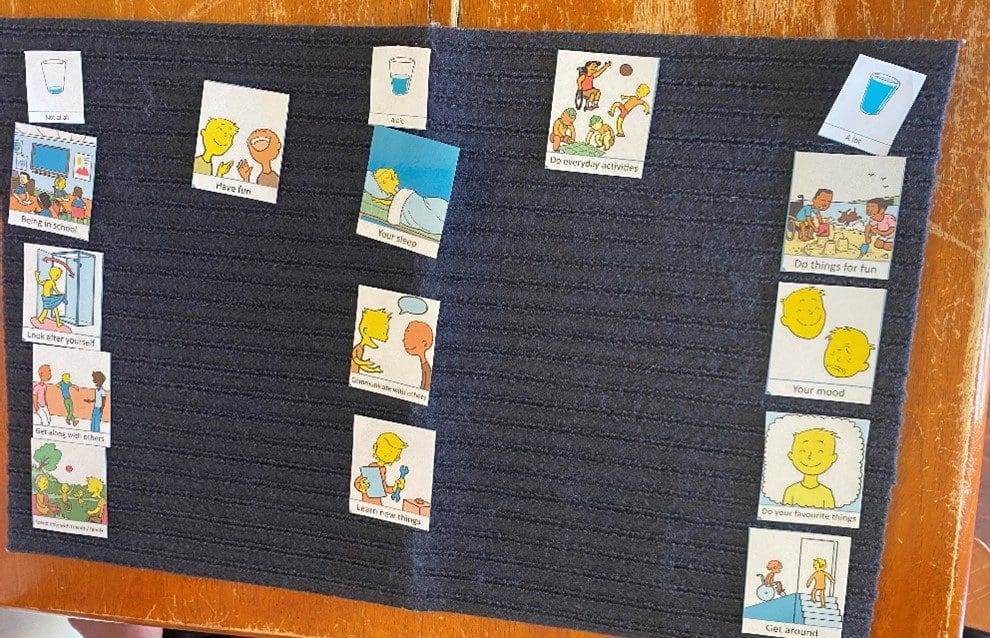
The second Talking Mat looked at pain related fear, with the lead in phrase ‘pain makes me……’. This was a more challenging and abstract concept, but was much easier to explore using the mat than on a standard pen and paper questionnaire. The Talking Mat versions can be interpreted as a 5-point response scale (the three response options and then two in-between sections), allowing us to still total an overall score for the assessment.
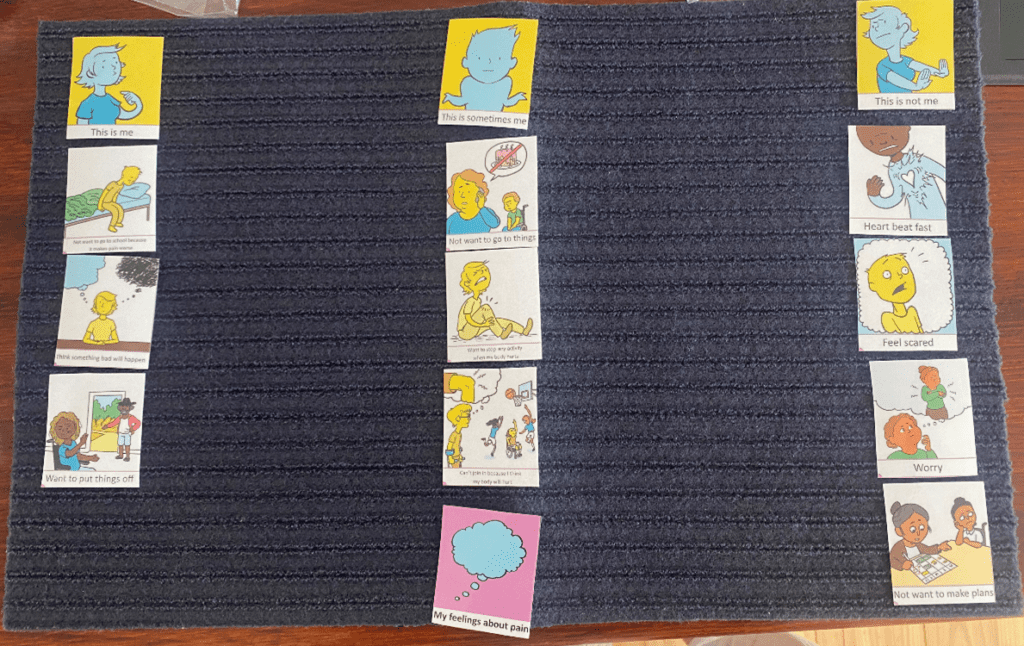
The feedback from children, young people and their families has been very positive. Families of children with cognitive impairment or complex communication needs have shared with us that previously it was assumed that their child could not self-report pain, and often they were asked to proxy-report on their behalf. Parents have told us how difficult it is to proxy-report on personal concepts such as pain-related fear, and that they couldn’t possibly know for certain how pain was making their child feel.
We are in the process of continuing to test the Talking Mats resource and look forward to making the it more widely available in the future.
Keep an eye on our website for more information about the Pain Assessment Resource as this project progresses.
If you are interested in completing Talking Mats Foundation Training, you can find out more here.
Thanks to Julia Pollock, Highly Specialist Speech and Language Therapist (SLT) from the REACH team in Perth for the second part of this latest guest blog sharing information about our exciting project, which has aimed to produce a resource to open up conversations with young people about sex.
By far, the most impactful feedback we’ve had during the pilot stage of this project has come from the social worker of the young person who I initially created the resource for. She was very keen to share with us that she had used the resource with the young person (two years on) and said it was ‘absolutely fantastic – I can’t tell you how good it was’.
Using the updated version, she was able to revisit the young person’s sexual knowledge and understanding and found that he was able to understand and have adult discussions around much more complex and abstract concepts than he had previously. The concepts included consent, contraception and sexually transmitted diseases. This was in stark contrast to his initial bewilderment when we first introduced the resource to him!
This has been a perfect case study for us as the resource has been used to support this young person through their entire criminal justice journey and through their sexual development into adulthood. The first draft had been used to initially gather information about his sexual knowledge and understanding in addition to information about the harmful sexual behaviour. It was later used to guide and support his sex education.
Now we have come full circle, with social work using the updated version of the resource to reflect on the past, helping him to understand his sexual development and to help guide his understanding around navigating future adult relationships in a safe and appropriate way.
‘He is ‘a confident, happy young man with the knowledge he needs for the future. There has been a lot of repair to his sense of self and moving from describing himself as a “monster” to understanding that he had a lack of knowledge and didn’t have the skills to navigate his sexual development safely. He is now able to accept his sexual feelings as being a “normal” part of development and to think how these can be expressed safely. His ability to integrate knowledge/reflect has been remarkable!‘
‘Importantly, we have also worked hard with the family to help them to accept him developing into a young adult with sexual feelings and the need to have access to peer relationships.‘
‘The Mat was brilliant in bringing all this together and providing the scaffolding to have these discussions with him.’
As a speech and language therapist, this process has been such a fantastic learning experience. It has been a joy and a privilege to work together with our social work and Talking Mats colleagues to create what will hopefully become an invaluable and essential resource in this field.
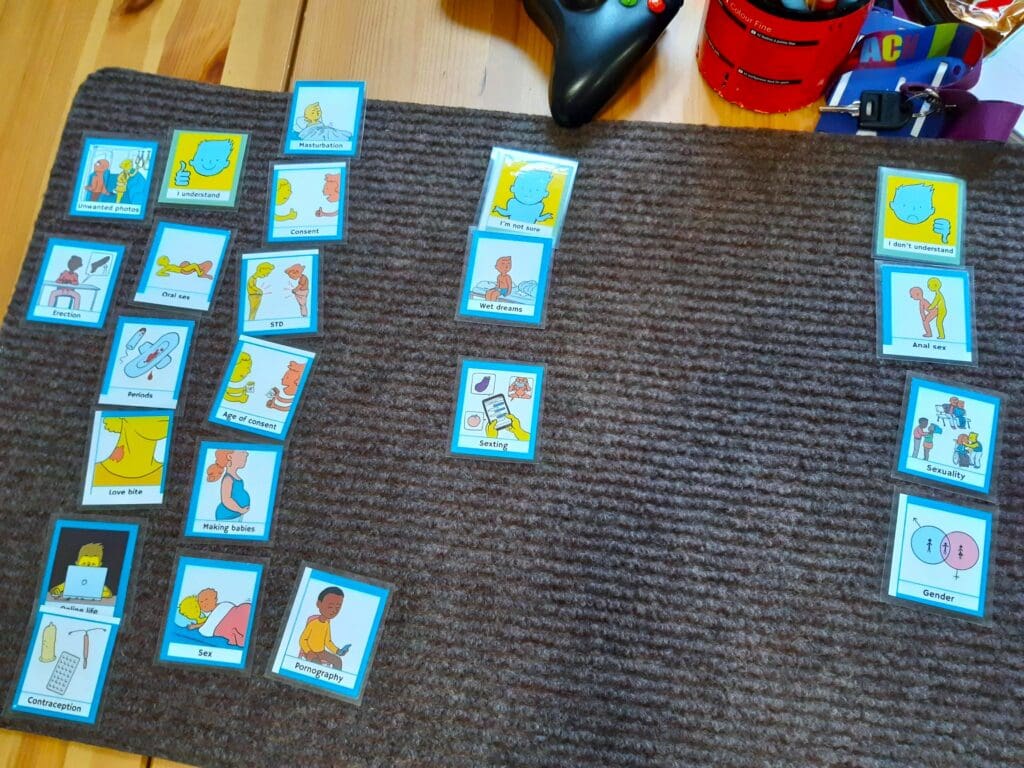
We are looking forward to sharing more information about the project and resource in an Advanced Webinar for practitioners who have already completed Talking Mats Foundation Training, in September 2024.
Inspired to think about Talking Mats Foundation Training? Find out about all the options we have available here.
Licenced Trainer and co-developer of the Funeral Planning Resource, Gillian Robertson is running Talking Mats Foundaion Training with specific sessions relating to the Resource. To reflect the working hours that practitioners interested in this may we are offering these sessions outside the 9am-5pm ‘norm’.
- Live video link (Teams) over 4 sessions, from 7pm until 8.30pm. 16th October, 23rd October, 13th November and 4th December (all sessions must be attended). 16 places available
- Face to face training at our headquarters in Stirling. 2 half day sessions, 7th February 2024 and 6th March 2024 (both sessions must be attended). 8 places available.
Gillian Robertson, an Interfaith Celebrant with a background in Special Education, instigated and drove this project with funding from the Big Lottery Awards for All. In a previous blog she describes her motivation and the early stages of the project.
Here’s a bit more information on the topics and who might use them.

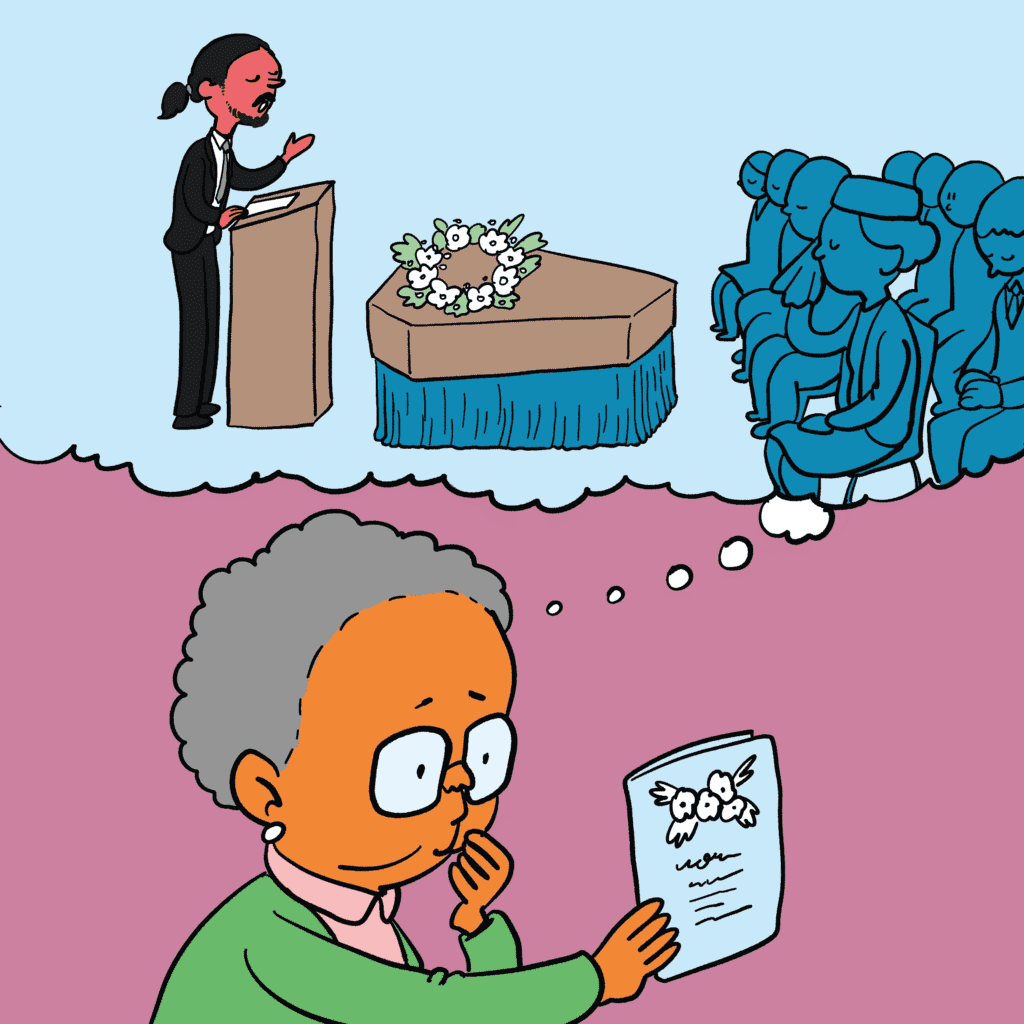
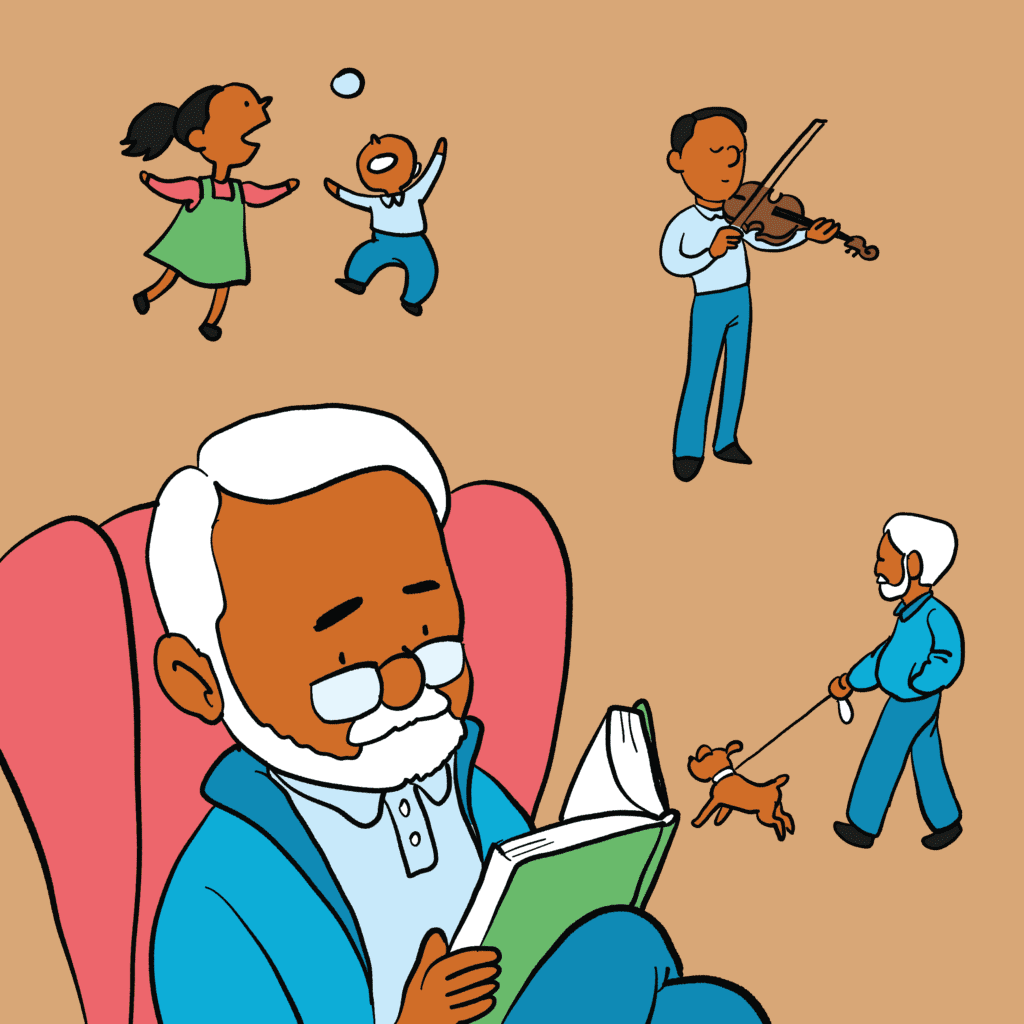
Funeral planning – this topic supports the initial conversation in planning a funeral leading to decisions about what someone would or would not like. It is particularly useful when planning for the future but can also be used by a celebrant / religious leader or funeral director to discuss what the family want for their loved one after a death has occurred.
Funeral Service – this topic supports the conversation which would follow on from Funeral Planning, leading to decisions about what someone would like or not like for the actual funeral service. Recording the first mat on this topic is a useful tool to refer to as plans progress. Who carries out this conversation depends on the context it is being used in. For example, if planning the service of a family member who has recently died then this is a very helpful resource for the celebrant or religious leader.
Eulogy – This topic supports conversations which highlight the important themes that someone would want included in their Eulogy. It is most useful when planning a service for someone who has recently died and relevant for the celebrant / religious leader to carry out when planning the service. The testing phase also highlighted that this topic can be used as part of the grieving process in a reflective way to help someone with learning disabilities remember the person who has died.
At the close of the project, with the testing phases completed, Gillian reflected and summed up the importance of this resource beyond the planning of funerals.
“The values behind Talking Mats are about making sure that everyone has a voice. If we deny people the ability to be heard, we deny them their human rights. When people’s voices are heard, improvements in their lives can be made.”
Foundation Training based on the resource is now available to book. There is a 20% discount if you attended the launch seminar and have the code to use at the shop checkout.
Talking Mats are delighted to share that we have been awarded funding to create a brand-new sensory resource for children and young people who have Speech, Language and Communication Needs (SLCN) and sensory integration/processing difficulties. The funding to create this resource has been awarded by the Communication Trust from the Communication Consortium Grants Programme – funded by The Rayners Special Educational Trust.
The Communication Trust Consortium, a coalition of over 35 not-for-profit organisations, is hosted by ICAN. They harness collective expertise to support the workforce and commissioners to support all children and young people’s speech, language, and communication skills across the UK.
This exciting year-long project will be led by Laura Holmes, our Lead Associate for Children and Young People. Laura has been part of the Talking Mats Team since 2016 and has over 20 years’ experience of working as a Speech and Language Therapist with children and young people, across a wide variety of settings in both NHS and independent sectors.

New Sensory Resource
This project will develop, pilot and launch a Talking Mats visual communication resource to tune into a child’s view of their sensory needs. It will enable children and young people who have speech, language, and communication needs (SLCN) and sensory difficulties to have a voice in their therapy assessment, planning and intervention.
“Sensory integration” and “sensory processing” refer to the processes in the brain that allow us to take the signals from our senses, make sense of those signals and respond appropriately. Children and young people with sensory processing/integration difficulties often have speech, language and communication difficulties, which may be linked to a diagnosis of autism (Green et al 2016); developmental language disorder (Simpson et al 2020); hearing impairment (Alkhamra et al 2020); or a history of trauma (Fraser et al 2017).
This work is important as sensory assessments can typically involve a mixture of formal and informal questionnaires and checklists which are carried out with Parents/Carers, Education Staff, and may also involve observations of the child in their environment. The issue is that Child Voice is not always routinely, or effectively, included in these assessments, or in subsequent planning and intervention – however the Royal College of Occupational Therapists recommends that ‘person-centred goals/outcomes must be established prior to intervention’ (RCOT, Informed View: Sensory Integration and Sensory-Based Assessments 2021). This also links with the current SEND system in England and GIRFEC in Scotland, both of which also emphasise the importance of child voice throughout assessment, planning and intervention processes.
We plan to work with experienced Talking Mats OT and SLT practitioners working with children and young people who have SLCN and sensory needs, to co-create this resource.
Get Involved
If you, or someone you know, works with children who have a diagnosis of SLCN and sensory needs, and is an experienced Talking Mats practitioner, please share the news about this project.
If this applies to the work that you do, and you would be interested in taking part in this project, please follow this link to express your interest: Communication Trust Project.
Expressions of Interest should be submitted by Friday 23/09/22.
Stay Connected
For more information about Talking Mats, please visit our website www.talkingmats.com or follow us on social media to keep up to date with all our news!
On Wednesday November 10th we held a colloquium with the University of Edinburgh and NHS fife to report on the findings of the research that was funded with the Burdett foundation . The easy-read version of this report can be found here.
48 people attended the online event on Wednesday and engaged in some very thoughtful discussion and reflection on communication in forensic settings. There was much to think about including whether ethos and values align with self-determination , how to get communication taken seriously by staff who are often under huge pressure. Consideration of where power lies in an organisation and an acknowledgment that in order to share power staff themselves need to feel they have power.
The recognition that in the promotion of shared decision making, you increase the risk of people taking what others may see as unwise decisions. The need to support the capacity of people to be involved in decision making early on and in the smaller decisions of life and not leaving including them to a crisis.
The importance of further research in his area and that small clinically driven research projects have an important role to play in addition to ones funded by bigger grants. There is much to digest and we are hoping to keep the conversation going.
If you would like to see for yourself the research presented and the topics discussed at the colloquium you can watch the recording of the Zoom session here.
If you want to attend foundation Talking Mats training please find out more here. if you have completed your foundation training please consider attending the Keeping Safe advanced online module which includes the Keeping Safe resource . If you have the Keeping Safe resource please download the new Being Included bolt on to use with it.
The Talking Mats Foundation Training is a course that builds people’s confidence in using and applying Talking Mats to their work. Organisations can access this as a group ensuring staff can embed the Talking Mats approach and principles into their practice. The training also gives staff a common language for embedding a patient centred approach at the heart of a service.
We offer online training by;
- giving organisations access to our online training platform – this is designed as self-directed course, supported by a Talking Mats tutor, with a variety of activities and resources to support learning
- zoom/teams sessions
- a combination of both 1 and 2.
2020 saw an increase in organisations approaching Talking Mats for online team training and this has continued into 2021. We will work with you to find the approach that best suits your staff group.
Online learning does not suit everyone and comments from participants are mixed. Some really like the flexibility of being able to work at their own pace and find the site user friendly whilst others miss the interaction that face-to-face brings. As a team we miss the face-to-face training too but believe that our online training and the support we offer organisations is an excellent alternative.
It is easier to discuss the impact of an organisational course by giving an example. We recently ran a course using our online learning platform combined with short introductory and a follow-up session on Zoom for 24 staff working in an NHS Paediatric service. Taking part on the course were Nurses, Psychologists, Occupational Therapists, Physiotherapists, Dieticians and Speech and Language Therapists. It was great working with such a multidisciplinary group. They all have communication at the heart of their practice and were keen to learn about a framework that could help them improve the effectiveness of their work. There were different reasons for doing the course, but a common theme was wanting to have more ways of directly engaging and building relationships with the children they were working with rather than relying mostly on carer views. They wanted to be able to involve young people more meaningfully in some of the complex issues that surrounded their care.
It is always positive when a course has immediate impact and this staff group applied their learning in very different ways, for example Talking Mats was used to;
- communicate with a young person with selective mutism,
- involve a young woman who was self-harming to contribute to the strategies that help her reduce those behaviours ,
- involve children in physiotherapy interventions.
One course participant said ‘I have practised with a couple of patients and it has made a massive impact on their lives already. One patient’s behaviours have dramatically reduced as I was able to support her to show how she felt about aspects of her care and resolve this.’ And another participant said ‘I have now used Talking Mats with a couple of young people with complex neurodevelopmental difficulties and this has helped engagement considerably, where things had felt stuck before’
An important part of Talking Mats training is to help participants think about their own communication style and how it impacts on interactions and relationships. Staff said;
- this course increased my awareness of my communication style and made me reflect more on how I communicate with my patients but also what I presume from my patients.
- I am more aware of the communication demands I place on others as a clinician/therapist and am more confident in engaging people with communication difficulties.
- It has made me think more about the language that i use during interactions.
- It has definitely made me reflect on my own style of questioning, and helped improve my pacing and language skills.
The feedback from this varied and engaged group of staff was positive and is summed up in this comment; ‘The course was very engaging, interesting, and easy to follow and understand. I have learned a lot from this. The reflective work throughout the modules really helped to connect the theory with the practice of Talking Mats. The course leaders were very involved, supportive and helpful!’
Our training is relevant to organisations working within Social Work, Advocacy, Dementia Support and Education as well as Health and Social Care. If you think you would like to organise a course for your staff group please get in touch at info@talkingmats.com to talk it through.
Join the twitter chat exploring the recommendations of the Citizen’s Jury for people with intellectual disabilities and need for inclusive research practices In 2018 the Scottish Learning Disabilities Observatory and Talking Mats were funded by the Wellcome Trust to set up a Citizens’ Jury for people with learning/intellectual disabilities. We wanted to develop and test an adapted method of deliberative democracy, and hopefully to demonstrate that people with learning/intellectual disabilities can consider complex questions relating to health research. We also wanted to show that with resources, planning and good quality facilitation this could lead to valuable insights into inclusive research.
After a period of knowledge and skills development with our citizens’ jury members we held the jury over 5 days at the end of 2019. In early 2020 the Jury published their consensus report containing 10 recommendations for health research. You can watch a video the jury members made to communicate the recommendations here: Research Voices Citizens’ Jury: Our recommendations Involving People with Learning Disabilities – YouTube We believe that this report provides crucial insights into how people with learning/intellectual disabilities want to have their voices heard when it comes to health research. The next stage for us and the jury members is to secure further funding to build on this work and take forward the jury’s recommendations.
Through the Research Voices project we wanted to share our learning and develop resources that could be shared with the research community. Our evaluation report provides a detailed review of the Research Voices project with comprehensive information about the jury process and outcomes. There is an easy read version available.
On Tuesday the 8th of June we will host a twitter chat about inclusive health research from 7pm – 8p.m . We hope to welcome researchers, self-advocates, third sector organisations, carers and others to contribute to this discussion. If you have never joined a twitter chat before this is your opportunity. Here is how:
- At 7p.m on the 8th June go to twitter search on the hashtag #researchvoices.
- The first thing will be introductions – people can say who they are and where they come When you respond in a twitter chat always use the hashtag of the chat, in this case, #researchvoices. Using the hashtag allows everyone to see the conversation.
- Then we will post question 1 – when you respond to a question start with the question number e.g. Q1 but still remember to use the hashtag #researchvoices
- Later on question 2 and question 3 will be posted. To respond put Q2 or Q3 and the hashtag #researchvoices
- You can either respond directly to the questions or respond to the comments that other people have posed by saying what you liked or by asking them another question. Remember still use the hashtag #researchvoices in your response.
- Sometimes people just want to observe the conversation. That’s fine too but remember you can join in the conversation at anytime
- We look forward to seeing you on the 8th of June for this important twitter chat to share ideas and good practice
Questions….
Q1 How do the recommendations of the citizens Jury align with current research practice, what changes will you make to implement them, and what are the barriers to implementation?
Q2 What does successful inclusive practice look like to you – share your top tips for promoting inclusive research?
Q3 Inclusive research builds skills, expectations and connections with researchers with learning disabilities. Does the research community have responsibility for maintaining this long term and if so how?
We are looking forward to our second Talking Mats Twitter chat on Thursday 10/12/20 7.30 – 8.30pm.
Join us to discuss and celebrate our new report ‘Can Scotland Be Brave’, which has a specific focus on children and young people’s participation. Find out more about the report here https://www.talkingmats.com/new-report-to-launch-10th-dec/
The report will be launched by the Scottish Government on the same day, to coincide with Human Rights Day 2020.
Here are the questions we will be asking:
Grab a cuppa – or better still, a mulled wine and mince pie! – and join us to share experiences and ideas.
Remember to use the hashtag #TimeToTalkTM on all your posts!
 Online training login
Online training login 

